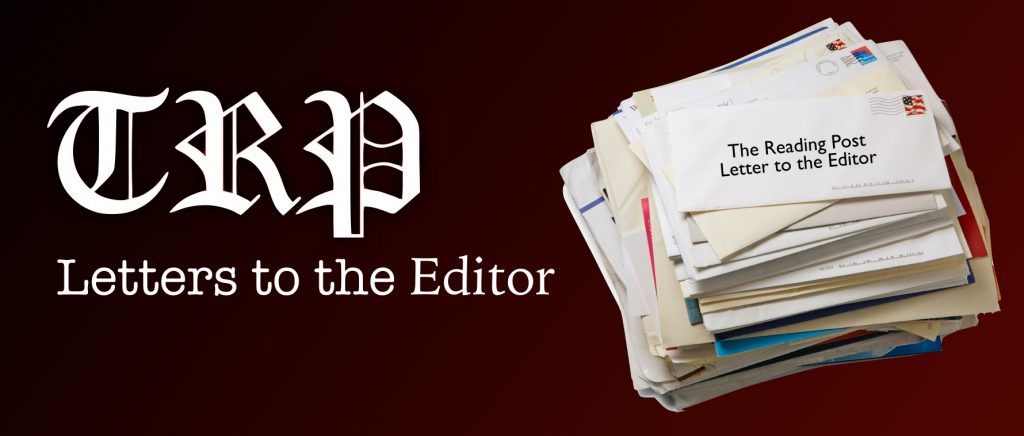
The Reading Post accepts Letters to the Editor. All letters must be signed. The Reading Post reserves the right to edit or not publish any letters received. Letters do not represent the views or opinions of the Post. editor@thereadingpost.com
Dear Editor,
A letter to the editor last week under the headline “The need for serious financial oversight” contained inaccurate information about both the budget process and the recommended use of Free Cash this year. As Chair of the Reading Finance Committee, I want to both correct the mistakes and better explain the process.
Fincomm is a group of 9 of your fellow residents that meet throughout the year in open meetings to review questions of municipal finance affecting all of our citizens. Members come from backgrounds that include finance and accounting, auditing, forecasting, legal and business management.
In November, we meet with the elected town boards and after reviewing expected revenues for the year, we evaluate and manage risks in both revenues and costs (like State Aid on the revenue side and health care on the cost side), and recommend a budget growth figure to be used to build the annual budget. For FY18, this figure was the lowest in many years– +1.25%.
For the past several years, our expected revenues have not been sufficient to support the level of services that the town has been receiving, and so FinComm has recommended and Town Meeting approved the use of a limited amount (between $1.2MM and $2.5MM) of “Free Cash”, the town’s stabilization funds, to support the operating needs of the town. Even with the use of these funds, our budgets have required substantial cuts from level services. Without substantial new revenues, using a sustainable amount of Free cash can only slightly mitigate the depth of cuts the town faces.
FinComm targets holding at least 7% of annual revenues in these stabilization accounts and we have been able to accomplish this with the help of conservative policies and some one time favorable events. This year, the recommended usage of Free cash is $1.2MM. This is the number that FinComm felt was appropriate and sustainable in November, and this is the number being requested of Town Meeting for the FY’18 budget.
The municipal and school sides work with the FinComm recommended guidelines to build their annual budgets. Each group then presents their budgets to their elected boards. FinComm attends and participates in most of these budget meetings. There were 2 key presentations on the municipal side and 5 on the school side in which FinComm participated, asking questions and better understanding the budgets.
After the Selectmen and School Committee review and approve their respective budgets, the Town Manager consolidates them into one budget and sends it to FinComm for review. FinComm members perform their own analyses of the budgets, build from their participation in the presentations made to the elected boards, and then the municipal and school departments present to FinComm to review any remaining open questions from FinComm. These are all open meetings. On the municipal side, we asked many questions in advance and at the presentations. On the school side, there were some 77 pages of school committee questions and answers provided and reviewed, supplemented by 40 questions from FinComm that we used for our analysis of the school budget. The departments put in a lot of time and effort to prepare the budgets and answer questions—we appreciate and build from that highly detailed level of work.
FinComm completes its review and analysis, and then offers changes to the budget that we feel are in the town’s best financial interests before voting by line item in the case of the municipal budget and in total in the case of the school budget, per Massachusetts General Law. FinComm then presents its recommended budget to Town Meeting for discussion and approval.
This year’s budget represents a lot of compromises. It is filled with cuts in services and programs—the municipal side was forced to reduce by 7.5 FTE’s, and the schools were forced to reduce 10.9 FTE’s. But in one key area at least, through teamwork between municipal and schools there is what you could call a “bandaid” that will allow the middle school foreign language program to continue in its current form for FY’18. Faced with the need to cut an additional $438k in school programs to meet the FinComm guidelines for FY’18, municipal and school departments agreed to budget reductions and holdbacks to cover a substantial portion of the $438k. FinComm at its meeting on 3/22/2017 recommended by a vote of 9-0-0 the use of an additional $100k in Free Cash to support this in the school budget to the point where the risk in the budget is felt to be reasonable. Our recommendation to Town Meeting is that this is in the interest of all of the taxpayers of the Town. And to be clear, the requested use of Free cash in total is at the November recommended level of $1.2 MM.
Our budgets are stretched to the point where the required cuts are causing noticeable declines in services on both the municipal and school sides. Part of FinComm’s oversight is to highlight when cuts in services can cause broader economic impacts. This is very much where we find ourselves today. Without an override in FY’18, services will continue to decrease sharply next year and in future years, and this will negatively impact community values as well as home values.
Mark Dockser
Chair, Reading Finance Committee
